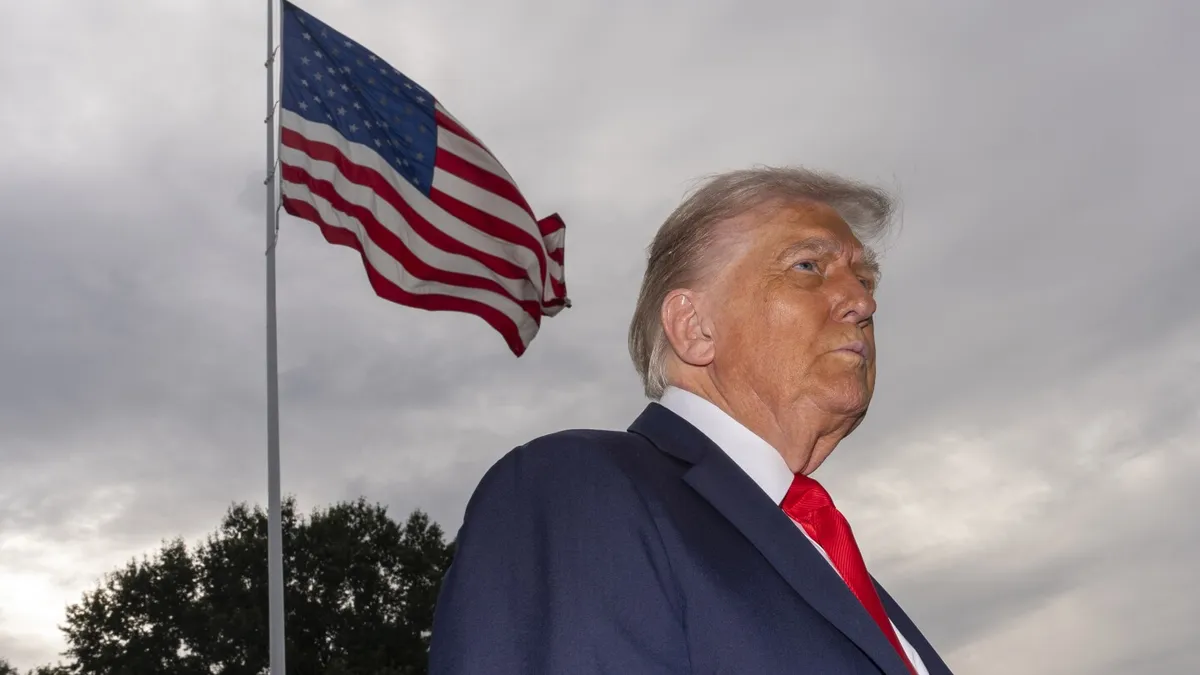
In a troubling turn of events, President Donald Trump has intensified his rhetoric against what he terms the “radical left,” following the assassination of conservative activist Charlie Kirk. This escalation has raised concerns that the Trump administration may be attempting to exploit the outrage surrounding Kirk’s death to suppress political opposition. While no direct link has been established between the assassination and political groups, Trump and his administration have discussed potentially designating certain organizations as domestic terrorists, initiating racketeering investigations, and revoking the tax-exempt status of progressive nonprofits.
The White House has pointed fingers at organizations like Indivisible, a progressive activist network, and the Open Society Foundations, established by billionaire philanthropist George Soros, as potential subjects for scrutiny. Administration officials claim their primary focus is on preventing violence, yet critics argue that this initiative represents an extension of Trump’s longstanding campaign against his political adversaries, threatening to erode free speech rights.
The potential move to weaken liberal groups could significantly alter the political landscape ahead of the crucial midterm elections next year, which will determine control of Congress and various statehouses. Trump stated, “The radical left has done tremendous damage to the country,” as he left for a state visit to the UK, asserting, “But we’re fixing it.” While Trump has previously made similar threats without taking substantial action, the renewed interest following Kirk’s assassination is causing alarm.
In response to these developments, dozens of nonprofit leaders from organizations such as the Ford Foundation, Omidyar Network, and MacArthur Foundation released a joint letter rejecting attempts to exploit political violence to mischaracterize their work or restrict fundamental freedoms. They emphasized that “Attempts to silence speech, criminalize opposing viewpoints, and misrepresent and limit charitable giving undermine our democracy and harm all Americans.”
Authorities have charged the suspect in Kirk’s assassination with murder, asserting that he acted alone. However, officials from the Trump administration have made sweeping statements about the need for broader investigations and punitive measures related to Kirk’s death. Attorney General Pam Bondi attributed the shooting to “left-wing radicals,” declaring that “they will be held accountable.”
Stephen Miller, a senior policy adviser, stated there is an “organized campaign that led to this assassination,” expressing a desire to channel “focused, righteous anger” to dismantle what he referred to as “terrorist networks.” This rhetoric has contributed to a climate of fear among nonprofit organizations, who are now recruiting legal assistance and enhancing security measures for their offices and personnel.
Nonprofits are increasingly anxious about Trump's executive actions, particularly those aimed at limiting their operations or freezing federal funding. Although proposals to revoke tax-exempt status have not yet materialized, the atmosphere has grown increasingly tense following Kirk's assassination. Lisa Gilbert, co-president of the government watchdog group Public Citizen, noted a “heightened atmosphere” among organizations that fear being unjustly targeted.
Trump has made political retribution a cornerstone of his comeback campaign, wielding the federal government to reshape various institutions, including law firms and universities. He has also initiated an investigation into ActBlue, a prominent liberal fundraising platform. Many anticipate that the administration will target significant funders like Soros to instill fear within the donor community.
In light of these actions, Sen. Chris Murphy, a Democrat from Connecticut, criticized the administration for diverting attention from the opportunity to unite Americans against political violence. He asserted that “Trump and his anti-democratic radicals look to be readying a campaign to destroy dissent.” On the other hand, White House spokeswoman Abigail Jackson dismissed Democratic claims, insisting that the administration’s focus is on targeting those committing criminal acts.
Trump's calls for investigations have garnered support from Republican lawmakers, with figures like Sen. Ted Cruz proposing legislation to empower the Justice Department to prosecute violent protesters using racketeering laws. Rep. Chip Roy has advocated for a special committee aimed at investigating nonprofit organizations, emphasizing the need to “follow the money” to identify those involved in coordinated assaults on American values.
As the political climate continues to evolve, the implications of Trump’s actions and rhetoric on free speech and political dissent remain a critical concern for many Americans.